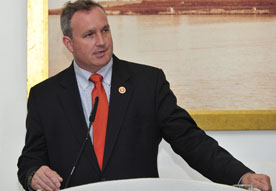Enhancing border security in the Mediterranean region
The Mediterranean basin is a crossroads for people, goods and ideas from the Middle East, North Africa and Europe. But it is also an area that has witnessed marked social and political change in recent years.

While the Arab Spring has seen popular demands for democracy, these changes have also created new security challenges: large strips of ungoverned, lawless and traffic-prone territories from eastern Libya, northern Mali, to the Sinai Peninsula and of course Syria, provide safe havens and sanctuaries for terrorist groups and other illicit actors. These developments pose considerable security threats to the broader Mediterranean region, making border security a major challenge for European NATO and partner countries.
Building a cross-border community
The International Border Security Forum held in Malta from 2 to 4 June brought together more than 50 participants to discuss border security challenges in the Mediterranean Sea basin. The workshop focused on various issues pertaining to border security, including international cooperation within the border security community, cross-border terrorism and its implications for the Mediterranean region, maritime challenges and priorities for regional security, and how natural resources shape border security.
The event provided a unique setting to discuss a wide range of issues, bringing together major stakeholders for border security from think tanks, academia, and public administration from the Mediterranean region, Europe and the United States. It also provided a platform for senior experts and government officials to debate and network in the spirit of building the international border security community.
Congressman Jeff Duncan (R-SC), who led a Congressional delegation to Malta for official meetings and to attend the conference, remarked during the workshop that: “Thanks to the German Marshall Fund, NATO, and MEDAC conference in Malta, we were able to better understand how border and maritime security best practices in the Mediterranean can apply to US border security efforts to address threats coming from North Africa and the Middle East. The conference also reminded me of the need for the US to further strengthen transatlantic ties with our partners in the EU, Middle East, and Latin America as well as ‘push our borders out’ and keep the American people safe.”
Mitigating threats

“Border security delivers profound challenges and threats for the Mediterranean region, but also for Europe and the United States,” said Michał Baranowski, Director of the German Marshall Fund of the United States in Warsaw.
Michael Gaul, Senior Advisor for Projects and Strategy in NATO’s Emerging Security Challenges Division, explained NATO’s role in identifying and mitigating threats to border security. “NATO wants to engage actively in cooperation with partner countries and NGOs, to solve the issues at hand in the spirit of fruitful cooperation in a multilateral setting,” he said.
Building trust and confidence were also identified as crucial elements for strengthening interregional cooperation in responding to challenges to border security in the Mediterranean region. Perceptions of border security can vary between countries, and these differences must be taken into account for building stronger regional ties when responding to the challenges of securing national borders.
Participants agreed that discussions during the workshop could lead to opportunities for practical cooperation in strengthening border security. “This unique constellation of key stakeholders has allowed us to engage in a very comprehensive and useful exchange of views on a number of important topics. I strongly believe that this dialogue should continue and needs to be further deepened in particular with a view to enhancing practical cooperation,” said Professor Stephen Calleya, Director of the Mediterranean Academy of Diplomatic Studies (MEDAC).
The International Border Security Forum was initiated by the German Marshall Fund of the United States in 2011. This year’s event was supported by the NATO Science for Peace and Security (SPS) Programme and organised in partnership with the Mediterranean Academy of Diplomatic Studies. It was the first SPS Programme activity led by Malta.
